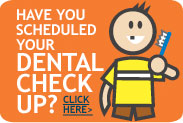Checkups at 2 Months
What Can Your Baby Do?
- He is much more alert than at 1 month of age.
- She turns to look at sounds and movements and loves to look at her hands. She will coo and respond to sound.
- He will respond more to his parents than to other people.
- He will smile and laugh.
- While on her tummy, she will lift her head, neck, and upper chest with her arms. She may occasionally roll over.
- A low-grade fever (100-101 degrees) is not nearly as worrisome now as it would have been in her first 2 months of life. You do not need to call in the middle of the night if your baby looks strong. But call when her doctor's office opens to make an appointment the same day since even at this age she is not as hardy as an older child.
- She will grasp a rattle put in her hand.
What Can Your Baby Eat?
- Your baby needs only breast milk or formula until she is several months old.
- Her formula should be iron fortified.
- Feeding solids at this age causes several problems (increased allergies, tummy aches, extra cost, and additional work for you). You should wait to introduce solids to her until 5 or 6 months of age.
- If your baby seems to have a lot of gas, simethicone (Mylicon) drops (3-6 drops every 4-6 hours) may help her.
- For hard stools or constipation, taking a rectal temperature with lots of Vaseline will help him pass his hard stool.
- Do not feed honey to your baby until at least 12 months of age since honey may lead to infant botulism, a serious and often deadly infection.
Immunizations
- The following immunizations are given in the first year of life:
- Polio- a viral infection that caused paralysis in thousands of children yearly in the 1950's. The polio vaccine is given in an injection (dead) and oral (live) form. It is usually given initially in the dead (safer) form, later in the live form which is more effective.
- Diphtheria- a respiratory and heart disease that used to kill thousands every year.
- Pertussis- also known as whooping cough, this respiratory illness is particularly dangerous for young babies and is always in the community in a small number of cases.
- Tetanus- a bacterial infection of dirty wounds that can be life-threatening.
- Hemophilus- the bacteria that was the most frequent cause of meningitis and other serious infections of the blood and lungs until the widespread use of this vaccine.
- Hepatitis B- a liver illness that kills thousands every year. Hepatitis B is spread from an infected mother to her baby at birth, sexually, and through blood in transfusions and IV drugs.
- These vaccines are usually combined together to reduce the number of injections. Improvements in the vaccines have reduced the fever and other side effects that babies often had.
Accident Prevention
- Do not hold your baby and hot drinks at the same time. Burns occur commonly this way.
- Do not use chains, string, or necklaces around her neck since this can cause choking.
- Toys should be hard to break, contain no detachable parts or sharp edges, and should be too large for him to swallow.
- Do not use infant walkers that fall over too easily or are collapsible.
- A sunscreen or insect repellant can irritate the skin of your baby. Avoid using them, but cover her with clothing to avoid sunburn and insect bites.
- Do not feed your baby while he is lying flat on his back. He will have more ear infections if you do.
- Use a car restraint for your baby at all times. Do not put your baby or other small children in the front seat of a car with airbags.
- Place your baby on her back for sleeping. Never leave your baby unattended when she is outside her crib.
- You should use a rectal thermometer when you suspect that your baby has a fever.
- If both parents will be working, the fewer children your baby is around, the fewer infections she will have.
Emotional and Social Development
- Babies usually travel well at this age as long as they are healthy, although they can have difficulty sleeping away from home.
- Be careful not to sacrifice attention to brothers and sisters for the sake of your new baby.
- He will like to be held and hear the voices of others. The verbal stimulation is important for his language development.
- Your baby should be sleeping better at night. Let her cry for 1-2 minutes before you go and pick her up to see if she will go back to sleep.
- He should sleep in a different room from you if possible.
Height ________ percentile ________
Weight ________ percentile ________
Head Circumference__________ percentile
________
The information contained within this website is no substitution for timely medical care.
Feel free to copy the information on this web
site and give to friends and family. Contact Dr. Glenn Wood
at Carousel Pediatrics (512) 744-6000
We are located at 7112
Ed Bluestein Blvd., #100 - Austin, TX 78723

